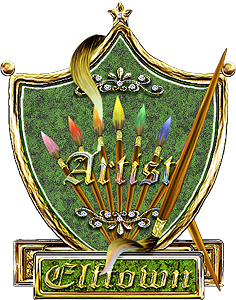| Entrance | Mainstreet | Wiki | Register |
|
# of watchers: 2
| D20: 8 |
| Wiki-page rating |  Stumble! Stumble! |
| Informative: | 0 |
| Artistic: | 0 |
| Funny-rating: | 0 |
| Friendly: | 0 |
| Previous: key_inspirational_elements | Up: artsieladie-the_artist | Next: key_inspirational_elements |

| Just being an artist wasn't quite enough for I like to share what I learn and experience with others, and know- ledge is most beneficial when shared with others I do believe. As a result, I have taught classes and workshops centered around drawing, painting with different mediums, and crafting on both basic and advanced levels. I do and have encouraged artists to create with this in mind: Make your art represent you, the artist, make it 'your' expression. Techniques and styles and what have you, should be secondary, because these can alter what is truly your creativity into being the ideas and ideals, expressions, etc., of others, thus detracting from the one important element, "your" art. Although it is good to acquire the input of how others perceive your work, don't expect everyone to like your work, for there are as many different individual tastes and preferences out there, as there are artists. Taking the advice of others is okay, but always go with what is from you, yourself, and if you incorporate newly learned styles, techniques, etc., always adapt them to "your" style, not the other way around, thus always maintaining the main agenda and this is to make "your" art, just this, "your" art, not ever someone else's. Every good artist eventually develops their "own" unique style, that will become associated with that particular artist, which does make sense, since each artist is an individual. Therefore the art of an individual artist should represent the expressionism of that individual, the artist. Just because someone doesn't like your art, this doesn't mean that you should then adapt "your" art to seek their approval, because it will then be about them and not you. Let "you" guide "you" in "your" expression of "your" art. I am deliberately emphasising "you" and "your" art here to drive home its significance. Don't compare your art to the art of others and then rate it from this perspective. Just as you wouldn't compare an apple to a peach, expecting the both of them to look the same, taste the same, feel the same, you then do not want to compare "your" art to others' works. Instead, compare "your" art to "your" art, particularly past works to present ones. Study both and look for how your art may have either changed and/or evolved; what you still like of your older works and what you don't and notice "what" fits into either of these two aspects. Look for aspects you feel you've improved upon, others you've pretty much stayed with, and still others you have moved away from. I periodically look through my older art. The pieces that I still like, feel I did well on/with back then, I consider them to be good pieces, since they are still pleasing to "my" eye. Then there are other works I'm not impressed with at all and these are not mistakes, but are instead still important stepping stones to where I am today as an artist. Our successes and accomplishment concept we can, but meanwhile our failures humble us, keeping us from becoming too confident and teach us, remind us, that we are all works in progress. Therefore, there is always room for learning and growing, thus always improving, regardless of age, regardless of most anything about us, really. This would certainly include the artist in the artist as well. Nurture and embrace your pluses, your strengths, for maintenance, energy, and hope to propel you forward for a better tomorrow; acknowledge your minuses, your weaknesses, to know what areas within you to improve upon and to remind you that you are human as are all the rest of us, artists and non-artists, alike. |
 ~ Artist_To_Artist (here) ~ Artist_To_Artist (here) ~ Digital_Art_Is_Art ~ Digital_Art_Is_Art ~ Key_Inspirational_Elements ~ Key_Inspirational_ElementsFOR MORE INTERESTING READING, ALSO SEE: ~ What's An Artist? ~ What's An Artist? |
| Show these comments on your site |
|
Elftown - Wiki, forums, community and friendship.
|